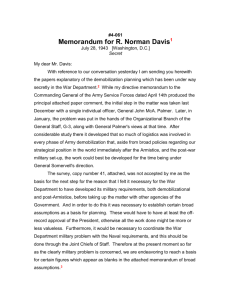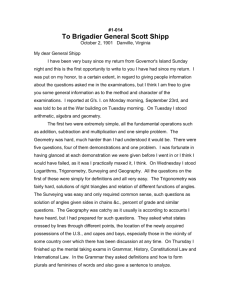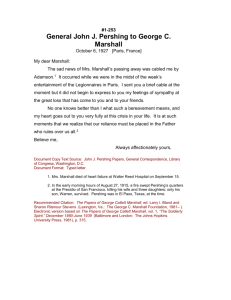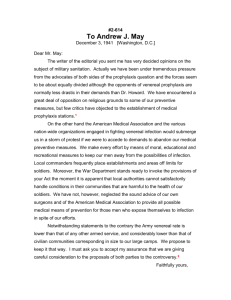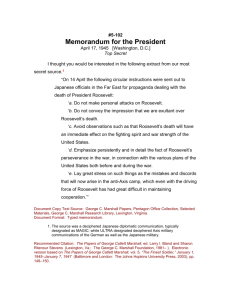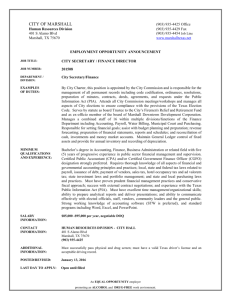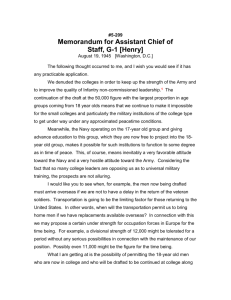5-251
advertisement
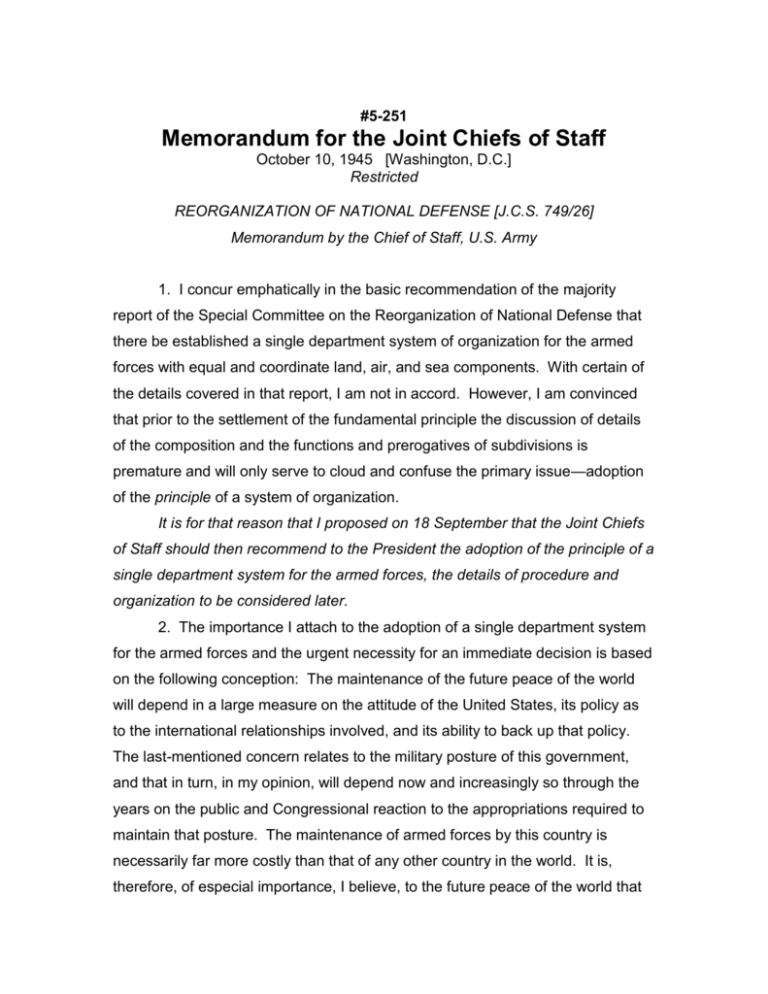
#5-251 Memorandum for the Joint Chiefs of Staff October 10, 1945 [Washington, D.C.] Restricted REORGANIZATION OF NATIONAL DEFENSE [J.C.S. 749/26] Memorandum by the Chief of Staff, U.S. Army 1. I concur emphatically in the basic recommendation of the majority report of the Special Committee on the Reorganization of National Defense that there be established a single department system of organization for the armed forces with equal and coordinate land, air, and sea components. With certain of the details covered in that report, I am not in accord. However, I am convinced that prior to the settlement of the fundamental principle the discussion of details of the composition and the functions and prerogatives of subdivisions is premature and will only serve to cloud and confuse the primary issue—adoption of the principle of a system of organization. It is for that reason that I proposed on 18 September that the Joint Chiefs of Staff should then recommend to the President the adoption of the principle of a single department system for the armed forces, the details of procedure and organization to be considered later. 2. The importance I attach to the adoption of a single department system for the armed forces and the urgent necessity for an immediate decision is based on the following conception: The maintenance of the future peace of the world will depend in a large measure on the attitude of the United States, its policy as to the international relationships involved, and its ability to back up that policy. The last-mentioned concern relates to the military posture of this government, and that in turn, in my opinion, will depend now and increasingly so through the years on the public and Congressional reaction to the appropriations required to maintain that posture. The maintenance of armed forces by this country is necessarily far more costly than that of any other country in the world. It is, therefore, of especial importance, I believe, to the future peace of the world that whatever we propose for our armed forces be on a sound, business-like basis to secure the most economical set-up compatible with requirements. I am strongly convinced that unless there is a single department for the armed forces within which the difficult and numerous complexities can be ironed out prior to a presentation of requirements to the Bureau of the Budget and the Congress, there can be little hope for the future of maintaining a military posture that the world will respect, and will respond to our peaceful overtures accordingly. There are, of course, many complications to be resolved in bringing the War and Navy Departments under one directing head. These complications could, in my opinion, never be satisfactorily ironed out in Congress, but I feel sure that an entirely satisfactory solution for a majority of the difficulties can be quickly found under the directing head of a single department. The development, in my opinion, should be on an evolutionary basis. A report to the President and the Congress at stated periods, for example, of the progress made, to be approved by the President or confirmed by the Congress by acquiescence or to be amended or disapproved by appropriate action. My own experience in resolving difficulties of unity of direction and of unity of command in this war has been that the problem of the details at first obscured the fundamental principles, but once a favorable decision was reached regarding the latter the minor difficulties could usually be readily resolved. With regard to such details included in the majority report of the Special Committee on the Reorganization of the National Defense, I desire to state now that I am opposed to a single military commander and to a large central general staff. These, however, are merely details and should not be permitted to confuse the consideration of the fundamental principle involved. 3. In considering the proposal for a single department it appears appropriate to face squarely our past experience. There has been a natural tendency in each department, War and Navy, to aim at self-sufficiency in its own military machine. The duplication and waste of the present system have been covered in the majority report to the Joint Chiefs of Staff of their Special Committee on the Reorganization of National Defense. The proposal has been made that we depend on the Joint Chiefs of Staff and other joint agencies for the necessary coordination and the elimination of overlapping duplication. There will be a general agreement, I think, that during the past year the coordination and collaboration of the Army and Navy under the impetus of war have reached a level which it would be extremely difficult, I think impossible, to continue in peacetime under any variation of the present organization. Even under the stress of war, agreement has been reached in the Joint Chiefs of Staff at times only by numerous compromises and after long delays, and coordination in materiel and administrative matters has largely been forced by circumstances arising out of the war, and then only incompletely. With the end of the war there is no longer a compelling necessity to reach at least compromise agreements on major matters. There appears no assurance that the Joint Chiefs of Staff could be genuinely effective in peacetime as a coordinating agency, as is evidenced by current events. The Navy Department proposed on 18 June 1945 to the Bureau of the Budget immediate legislation to authorize a permanent Navy of no less than 660,000 total personnel. Neither the Joint Chiefs of Staff nor the War Department had knowledge of this major proposal, concerned with the national defense, until it was referred to the Joint Chiefs of Staff by the President two months later on 21 August for review in relation to the over-all peacetime requirements of the armed forces and for the determination of a comprehensive plan for the consideration of the President. Also, the Congress is now seriously considering similar legislation covering the post-war strength of the Navy and the Marine Corps, on which the War Department was neither consulted nor informed. In other words, on this first important post-war matter of joint concern, lack of departmental coordination is clearly evident. And, what is even more important to observe, the discussions and recommendations presented to the Congress in support of this legislation lack a basis of coordination with the War Department. Such a procedure inevitably means a confusion of Congressional thought with the consequent difficulty or impossibility of reaching sound conclusions. During the war time was the compelling factor—not money. In time of peace money will be the dominating factor, and the most difficult obstacle to overcome in the maintenance of a military system that will command the continuing respect of the world. Discordant voices and views regarding the annual appropriations, which appear inevitable under the present system which encourages the diverse views on the part of the personnel under the two departments, will be fatal, I am convinced, to the best interests of the country.1 Document Copy Text Source: George C. Marshall Papers, Pentagon Office Collection, Selected Materials, George C. Marshall Research Library, Lexington, Virginia. Document Format: Typed memorandum. 1. On the evening of October 13, Major General Arthur R. Wilson (a career officer who had worked since mid-July in the Office of the Chief of Staff on committees on retirement and the National Guard, and who occasionally served as a White House liaison) had an informal meeting with President Truman during which Wilson delivered the text of a draft presidential statement on the unification issue that Marshall and Secretary of War Patterson had approved. Truman agreed with most of the War Department’s proposals and said that in the Senate Committee on Military Affairs hearings on the issue (scheduled to begin October 17) the army should “take off the gloves” and “go in slugging” in presenting its case. Concerning the proposed message, however, the president said that he first had to send a message to Congress supporting universal military training (this was done on October 22). Moreover, he did not wish to alienate members of the House and Senate Naval Affairs committees, who were strongly opposed to unification but whose votes were needed in support of universal military training. Finally, the president hoped that at this Senate hearing the opposition to unification would exhaust itself and make all their points against the bill so that he could have the final rebuttal. (Major General Wilton B. Persons Memorandum for the Chief of Staff, October 14, 1945, and Proposed Message on Unification of The Armed Services, October 13, 1945, GCMRL/G. C. Marshall Papers [Pentagon Office, Selected].) On October 17, the special committee’s report, together with separate army and navy reactions to it—as expressed by Marshall and King at the J.C.S. meeting—were forwarded to the president. The following day Marshall testified before the Senate committee on the unification idea. See the summary of his testimony, Papers of George Catlett Marshall, #5-253 [5: 331–32]. Recommended Citation: The Papers of George Catlett Marshall, ed. Larry I. Bland and Sharon Ritenour Stevens (Lexington, Va.: The George C. Marshall Foundation, 1981– ). Electronic version based on The Papers of George Catlett Marshall, vol. 5, “The Finest Soldier,” January 1, 1945–January 7, 1947 (Baltimore and London: The Johns Hopkins University Press, 2003), pp. 327–330.
